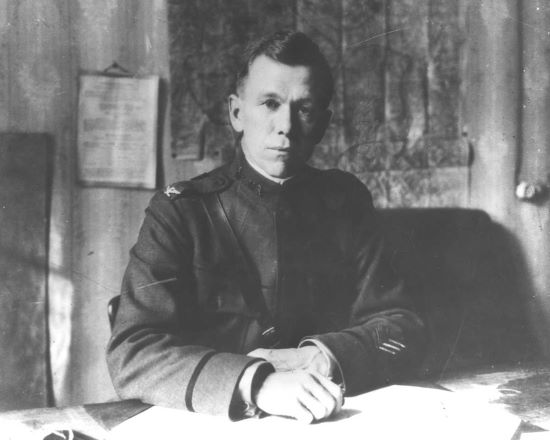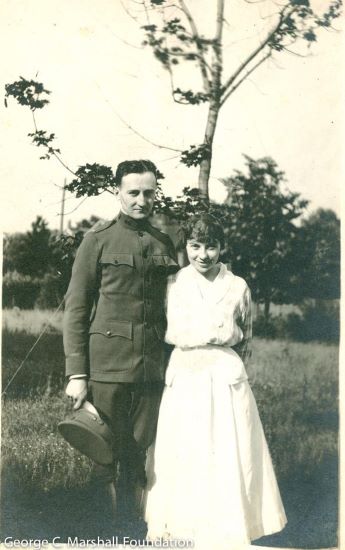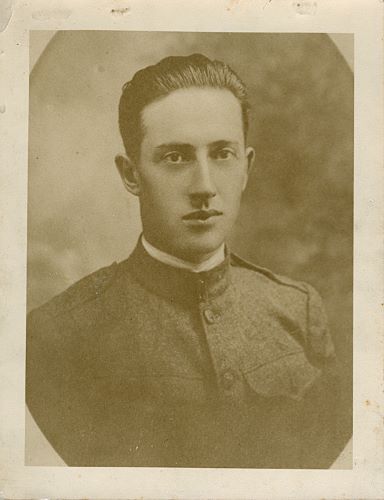Armistice Day. From the Latin arma (weapons) and sistere (to come to a stand or stop).
The eleventh day of the eleventh month at the eleventh hour. It was the end of the War to End All Wars.
How did soldiers react to the news that the long, terrible fight was over?

Col. George Marshall, assistant G-3 (Operations) at American Expeditionary Forces Headquarters, was asleep when the call came early that morning. From his Memoirs of My Services in the World War, 1917-1918
About 6 a.m., the telephone again awakened me, and this time Colonel Carl Boyd’s voice came over the wire to inform me that the Armistice had been signed a few minutes before and that all fighting was to cease at 11 a.m. He was General Pershing’s senior Aide, and as I recognized his voice, I could accept this as authentic.
This phone call did not mean the danger to Marshall was over – at breakfast that morning, he was nearly killed.
All the members of the mess assembled for a late breakfast at ten-thirty … and coming as a sort of parting thrill, there was a tremendous explosion in the garden just outside the single window, which was in the prolongation of the length of the mess table [the short end of the table faced the window]. We were blown out of our chairs and I landed on the floor sitting on the back of my chair, my head getting a fairly heavy bump against the wall. I thought I had been killed and I think each of the others had the same idea, but we picked ourselves up and found that aside from the ruin of the breakfast, no particular damage had been done.
A few minutes later a young aviator hurried in to see what had happened, and he explained that he had been out in his plane with some small bombs, all of which he thought had been released, but it seems that one stuck to the rack and as he sailed down just over our roof to make his landing in the field beyond our garden wall, the remaining bomb jerked loose and fell just ten yards outside the window. The thick walls of the house and the fact that the window was in direct prolongation of the table, and no one was sitting at either end, saved us from a little tragedy just thirty minutes before the hour of the Armistice.
Marshall then wrote about the difficulty in getting word of the Armistice to troops on the front lines.
Getting word to the troops to cease fighting and advancing at eleven o’clock, was quite a problem on some portions of the lines. The second and Eighty-ninth divisions had been engaged in a river crossing near Beaumont that night, and some of these troops made such rapid progress in the wooded hills beyond the river that the messenger did not reach them until just before twelve o ‘clock. They had captured prisoners after 11 a.m., and these we were promptly called upon by the Germans to release, which we did.

Army Signals Corps codebreaker Capt. William Friedman wrote to his wife, Elizebeth, back home:
Honey, it’s all over now! I’m up at the office and the news has just come in that hostilities cease at 11 o’clock this morning. The enlisted men have broken forth into song! And in the office too. That’s unheard of. There will be very little work today.
And now the question is for us two – what next. Will it mean a quick demobilization, with a speedy return? Or will it mean having to stay on in this department, somewhere in France – or Germany?

Bath County, VA, native Pvt. Homer E. Simpson, a member of the 81st Division, wrote in his journal:
At 10:30 Major Willis came by and said “Boys, keep your head down, it will all be over in half an hour.” The Major had a smile on his face — the first in many days. We thought that he had probably lost his mind, so we hardly gave his command a second thought. About fifteen minutes later a motorcycle rider came by, picking his way around the shell holes and obstacles. He said that an armistice had been signed and it would go into effect at eleven o’clock. We didn’t pay much attention to him. Artillery fire was just like drum fire now. The Germans were also throwing over everything that they had. At 11:00 sharp all firing ceased. We were bewildered and could not realize that it was all over. I did not see a smile on a single face. Orders were given to unload our guns. Men began coming out of holes in the ground. Everything quiet as a country church yard. Ever now and then someone would say, “There must be something to it.”
This sound recording is a re-creation from the Imperial War Museum of what Pvt. Simpson would have heard that morning:
It is traditional to observe a moment of silence at 11 a.m. on Armistice Day, now called Veterans Day to include all veterans, as the Great War was not the end of war.
May you, too, hear the birds sing.
Melissa has been at GCMF since fall 2019, and previously was an academic librarian specializing in history. She and her husband, John, have three grown children, and live in Rockbridge County with three large rescue dogs. Keep up with her @MelissasLibrary.
